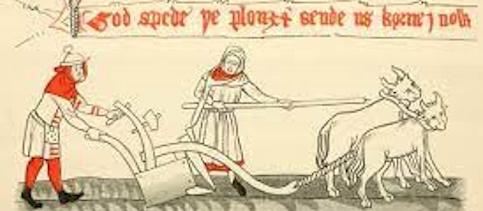Early January - Plough Monday
Written by Anne Newman Monday 7th January 2019 updated 2023
Today (2024 - 8th January) is commonly known as Plough Monday. This is the traditional start of the English agricultural year.
While local practices may vary, Plough Monday is generally the first Monday after Twelfth Day, 6th January.
References to Plough Monday date back to the late 15th century. Due to the ground being frozen solid in much of northern Europe, the Twelve Days immediately after Christmas formed an extended holiday in rural areas.
In the Middle Ages, Plough Monday was the time when boys with ploughs were to return to working in the fields. The plough boys disguised themselves and went to the houses of wealthy landowners instead to extort money. The plough boys received no pay when they were not working, and the gulf between rich and poor was so great that it was one way they could redress the balance.
These itinerant workers— also known as Plough Jacks, Plough Bullocks or Plough Stots —blackened their faces so that the landowners would not recognise them. This tradition continued for centuries afterwards.
By the 1400s, Plough Monday was dedicated to raising funds for local parishes. Groups of skilled ploughmen formed plough guilds which had a plough-light lit in the local church, as a way of asking for God’s blessings on the fields. A portion of the funds collected on Plough Monday helped to keep these lit throughout the year. Some priests also blessed ploughs on this day. More pictures at Project Britain.
 |  |
The customs observed on Plough Monday varied, but a common feature was to haul a plough in procession from house to house collecting money, they were often accompanied by musicians, an old woman or a boy dressed as an old woman, called the “Bessy”, and a man in the role of the “Fool“ dressed in rags whose job was to carry a box to collect money from the spectators.
Plough Monday festivities died out in many places from the 19th through to the 20th centuries. As is happening with at lot of the old customs, many place are reviving these old traditions so Plough Monday may return anew.
In an area of Cambridgeshire a straw bear was led through the streets on Plough Monday. It is speculated that this may have grown out of a pagan ritual or just maybe an extension of disguising oneself using straw, inspired by dancing bears that used to tour the fenland villages.
Here’s a taster of Plough Monday at Maldon -





